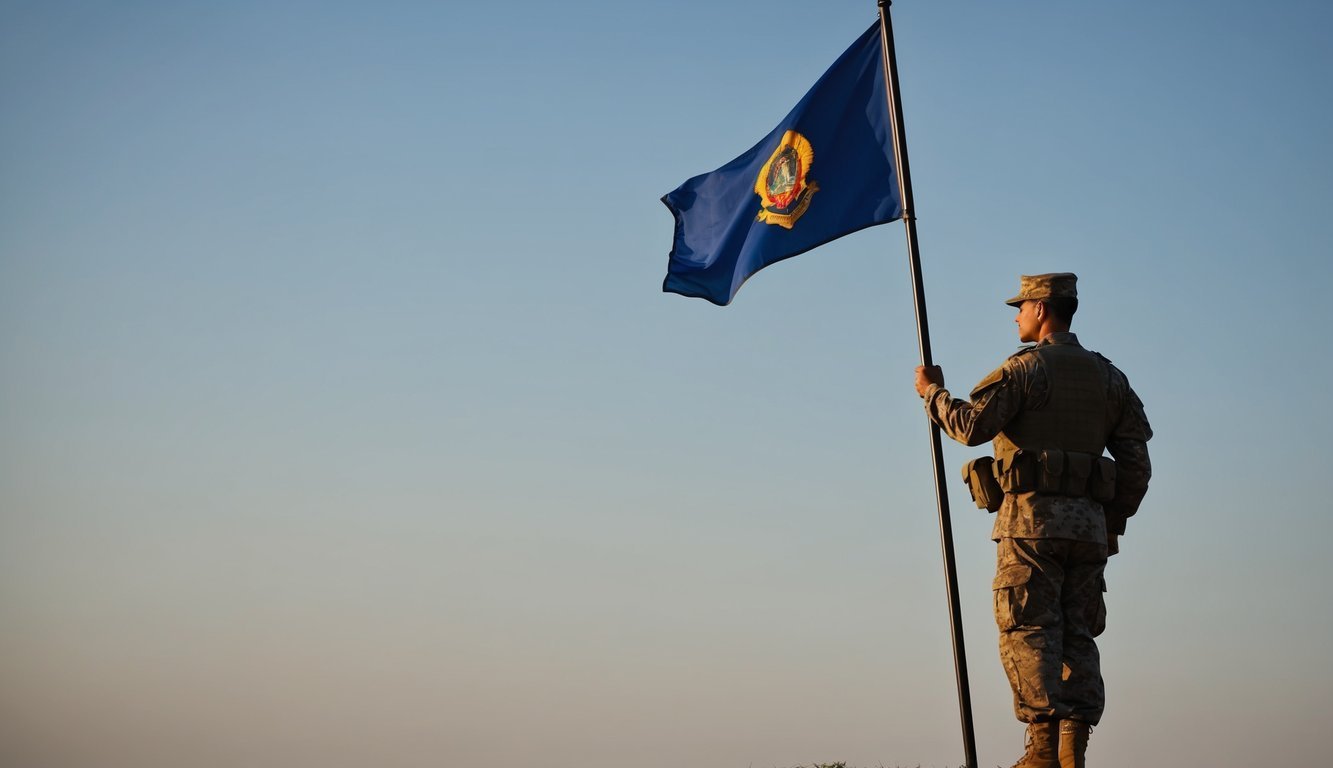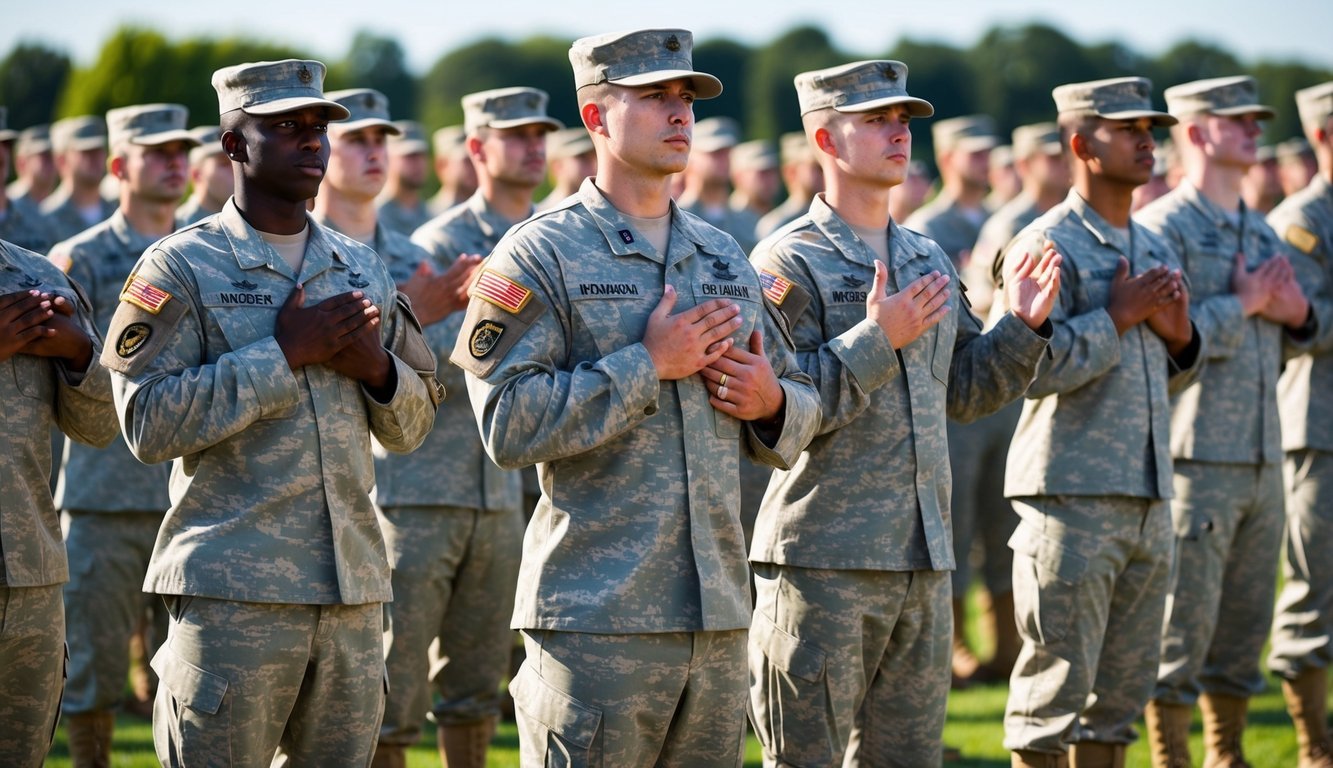Physical Address
304 North Cardinal St.
Dorchester Center, MA 02124
Physical Address
304 North Cardinal St.
Dorchester Center, MA 02124
The Soldier's Creed emphasizes pride, respect, and selfless service, guiding soldiers through integrity, courage, and a commitment to their unit and mission.

The Soldier’s Creed is more than just a few words; it’s about what it means to serve the United States with pride.
When I recite the creed, I feel the weight of respect and honor.
It’s a reminder of the sacrifices many have made.
Each of us pledges selfless service, which often means putting others before ourselves.
I wonder how many times this simple idea shapes our actions during tough times.
Integrity also plays a crucial role in the creed.
It means being honest and upholding strong moral principles, even when no one is watching.
Are you tired of spinning your wheels and getting nowhere? Simply put, you’re out of sync: you’re out of alignment with your astral configuration.
But: there’s a kind of map that can help you reclaim your alignment. Think of it as your own personal blueprint to success and happiness: a blueprint that will help you live your most amazing life.
Get started here.
I believe that personal courage reflects our spirit.
It’s about the bravery to face challenges and risks, both on the battlefield and in everyday life.
The warrior ethos isn’t just for combat; it’s a mindset.
It drives us to keep going, no matter what.
I often think about how this mindset helps unite soldiers, creating a bond that’s hard to break.
Each word in the Soldier’s Creed speaks to our shared experiences, values, and commitment to our fellow citizens.
It’s incredible how something so simple can hold so much meaning.

Living the Army Values isn’t just about memorizing them; it’s about weaving them into our daily lives.
These values guide us as we work together, train hard, and strive to become proficient in our roles.
Let’s dive into how we can really embrace these core principles.
Incorporating the Army Values every day can be a game changer.
I think about loyalty, duty, respect, selfless service, honor, integrity, and personal courage.
These aren’t just words; they’re a way of life.
When I show respect and support my team, it creates a bond that strengthens our unit.
I find it fascinating how tasks we practice, like drills, connect with these values.
For instance, selfless service shines through when we put others before ourselves during tough training sessions.
We become disciplined and accountable by living these values.
It’s about being proud of who we are and what we stand for, ensuring we’re always expert and professional in our roles.
Building the warrior spirit is about more than just physical toughness.
I believe it’s a mindset.
When we focus on the Army Values, we create a sense of pride that fuels our performance.
This spirit keeps us motivated and ready to face challenges head-on.
Engaging in warrior tasks, I realize that this isn’t just skill-building; it’s about developing resilience.
Training together fosters teamwork too.
We learn to trust one another, which is vital in the field.
Honestly, living these values means embracing the idea that we’re part of something bigger.
It makes me think about how each of us contributes to the overall mission, and that’s what being a soldier is all about.

Becoming a soldier is more than just a job.
It’s a commitment that transforms a civilian into part of something much bigger.
This journey has a strong base, built on training, values, and a shared mission that unites individuals in the U.S. Army.
When I think about the shift from civilian life to being a soldier, it feels profound.
Enlistment isn’t just signing a piece of paper.
It’s a decision that leads me to the rigors of basic training, where I learn basic skills.
I’ve seen how that initial awkwardness turns into confidence.
Unit cohesion is important; we learn that we rely on each other.
Training together creates bonds that last a lifetime.
From drill sergeants to fellow recruits, I had to adapt quickly.
I wondered how these experiences would shape my identity.
It’s fascinating, really.
Commitment to the mission defines what soldiership is all about.
For me, it translates into a promise to serve my unit and uphold a set of values like integrity and courage.
There’s something powerful about knowing that every soldier, whether enlisted personnel or commissioned officers, shares that commitment.
I remember times when I saw sergeants lead by example.
Their leadership isn’t just about orders; it’s about inspiring others.
Honestly, it makes me think about how essential leadership is, not just in the army but in life.
Each mission isn’t just a task; it’s part of a larger purpose that drives us all forward.

The Warrior’s Resolve speaks to our ability to stand firm when things get tough.
It’s about mental toughness and the discipline to face fear and adversity.
There’s a strong bond among soldiers that can’t be broken, even when the going gets rough.
I think one of the most powerful traits of a warrior is the refusal to accept defeat.
When it feels like the world is crashing down, that’s when we dig deep.
I’ve learned that true strength comes from facing challenges head-on.
It’s not just about physical battles.
It’s mental, too, really.
When fear creeps in, I remind myself to stay disciplined.
We’re trained to never quit, never leave a fallen comrade behind.
This resolve helps us push through those moments of doubt.
I wonder if everyone realizes how much this mindset shapes us.
It’s about carrying that warrior spirit with pride, always ready to fight for what’s right, no matter the situation.
There’s something special about the bonds we form in combat.
Honestly, it makes me think of family.
We rely on each other, and that trust creates a bond that’s hard to describe.
When a comrade falls, it hits us all.
We don’t just mourn; we vow to keep their spirit alive, to honor their sacrifice.
This connection gives us the strength to keep going, even when the going gets tough.
We lift each other up.
I’ve seen moments where soldiers rally together, overcoming the toughest obstacles just to support one another.
That encouragement makes all the difference.
The shared experiences and the warrior creed guide us, reminding us that together, we can face anything.

So, I’ve been thinking about what folks often wonder about the Soldier’s Creed and related ideas.
There’s a lot to unpack, from the actual words of the creed to the values that guide soldiers and even some other creeds for different branches of the military.
The Soldier’s Creed starts with a powerful statement about identity and commitment.
It goes something like, “I am an American Soldier.” You get the sense of pride and duty right from the start.
The Army values are kinda like a backbone for soldiers.
They include Loyalty, Duty, Respect, Selfless Service, Honor, Integrity, and Personal Courage.
These values guide decisions and actions, shaping how soldiers interact with each other and face challenges.
The Warrior Ethos is closely tied to the mindset of soldiers.
It emphasizes readiness to fight and the importance of honoring the mission and fellow soldiers.
The focus is on being tough and resilient.
You bet! Infantry soldiers have their own distinct creed.
It’s designed to reflect their specific role on the battlefield.
This infantry creed highlights their dedication to fight with courage and to protect their comrades in arms.
Yup, they sure do! The Marines have something known as the “Marine Corps Motto” and their own set of values and creeds.
It’s all about building a unique identity while emphasizing honor, courage, and commitment.
Each branch has its character, which is kind of cool, don’t you think?
Yes, the Army has its own creed song! It’s usually sung in a rhythmic way that reinforces the pride and connection soldiers feel.
The music helps boost morale, and you can really feel the energy when it’s sung together.
It’s a reminder of shared purpose and unity.